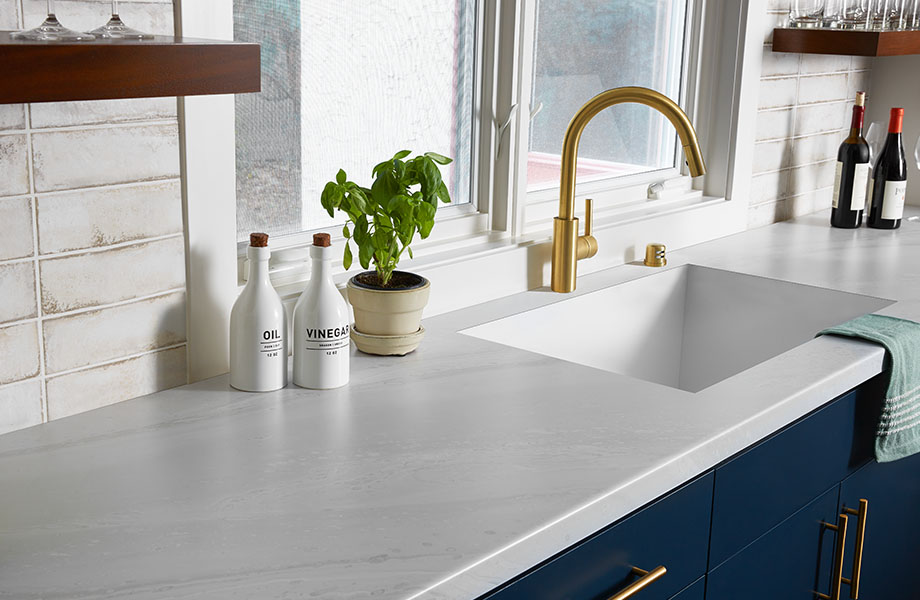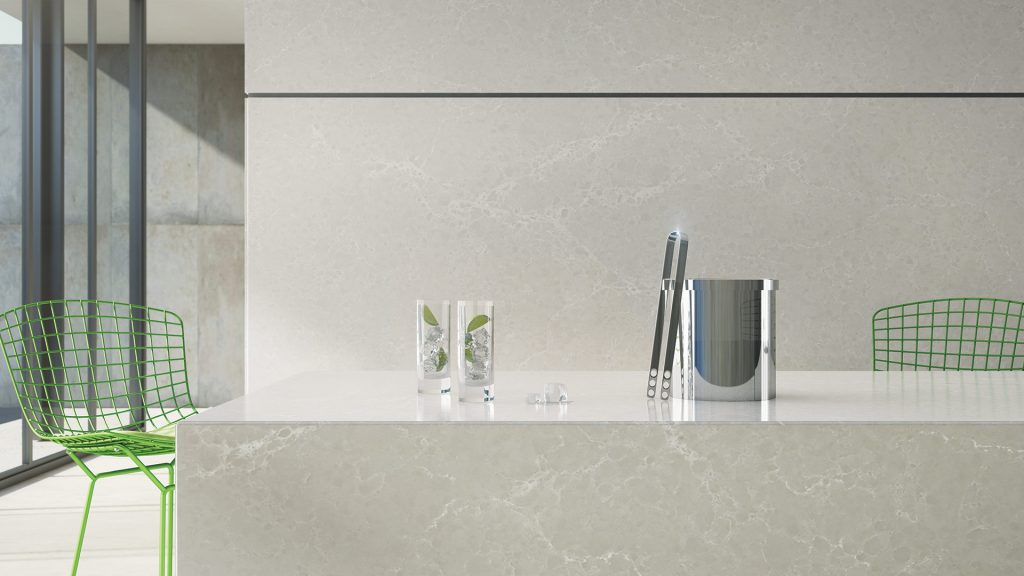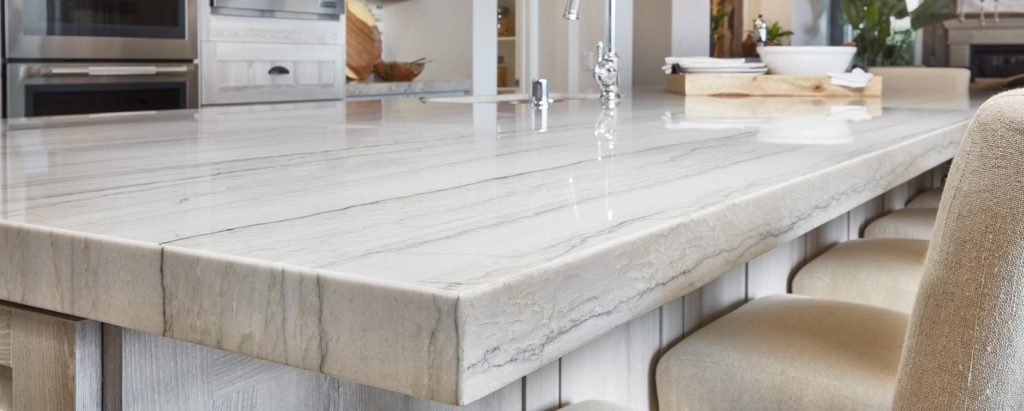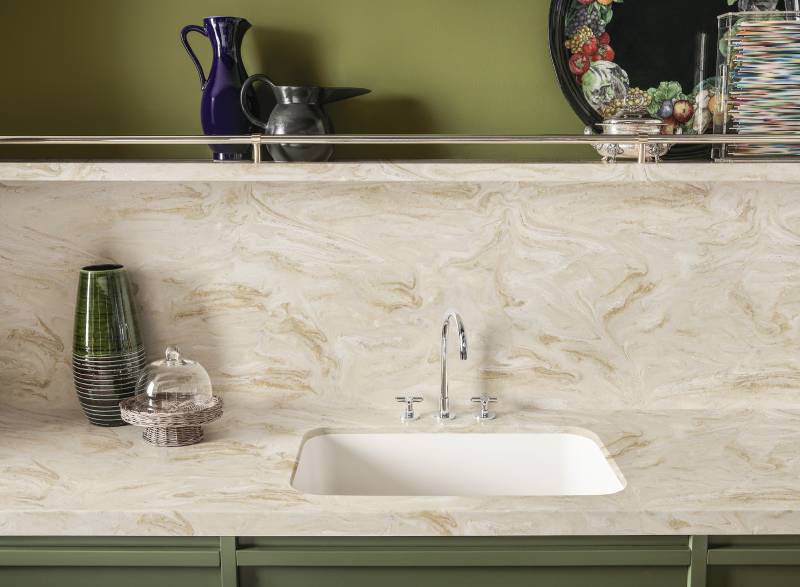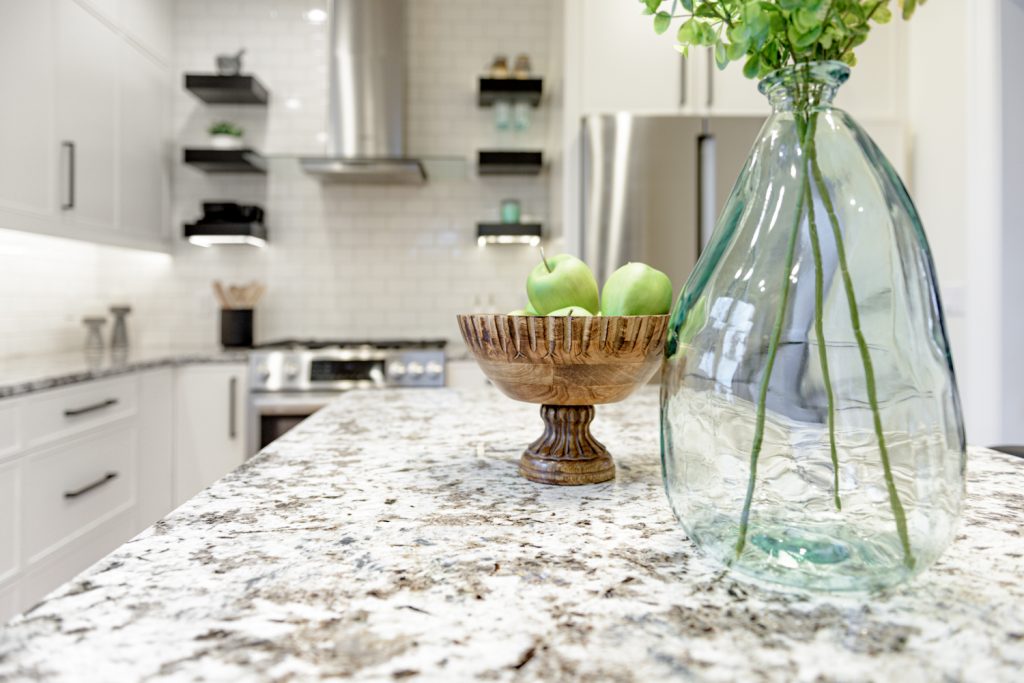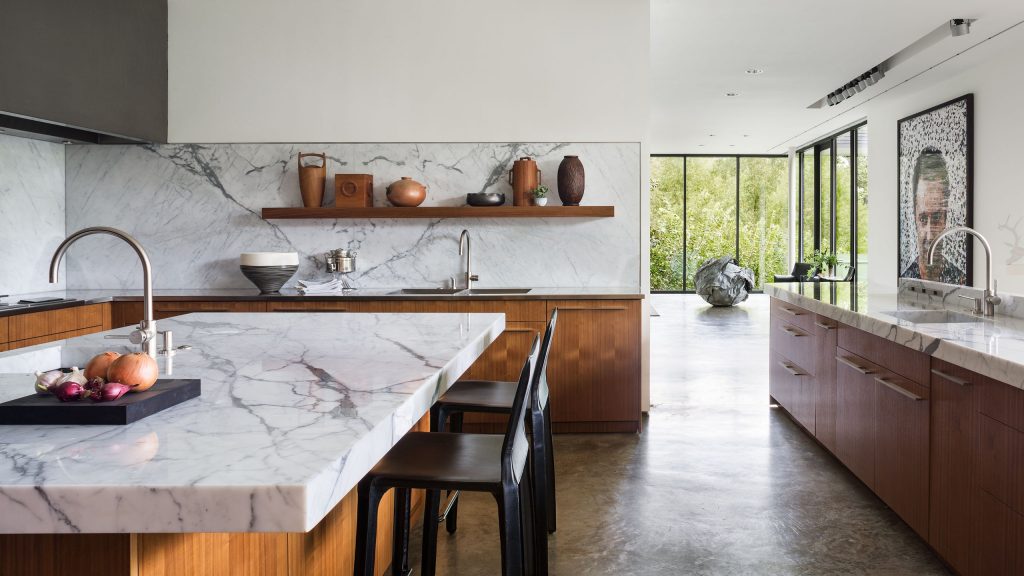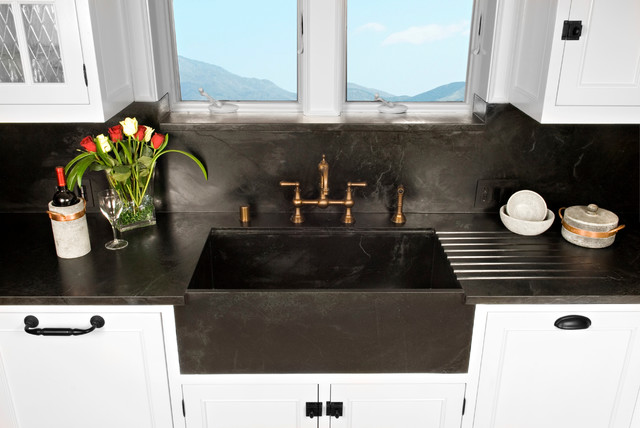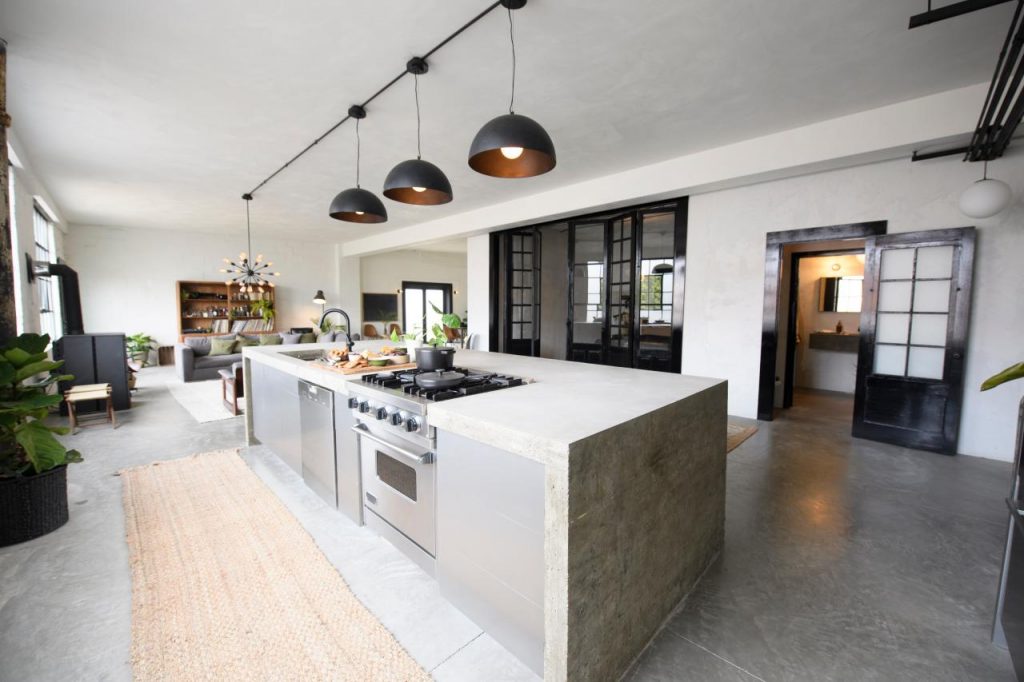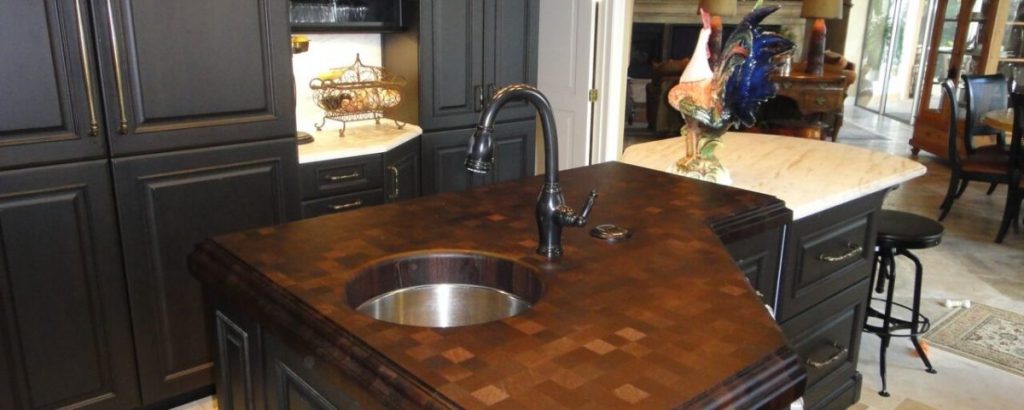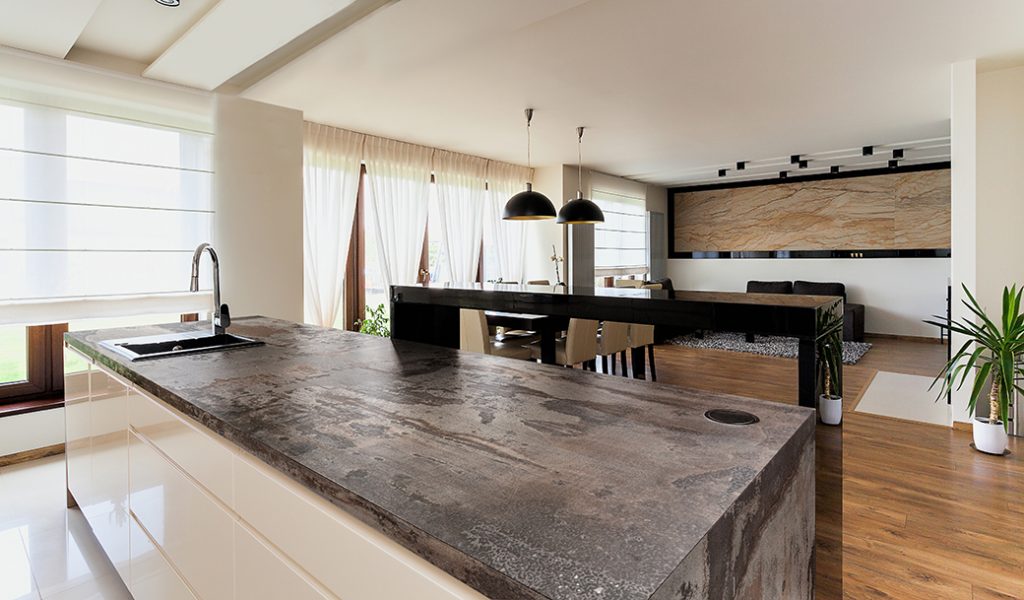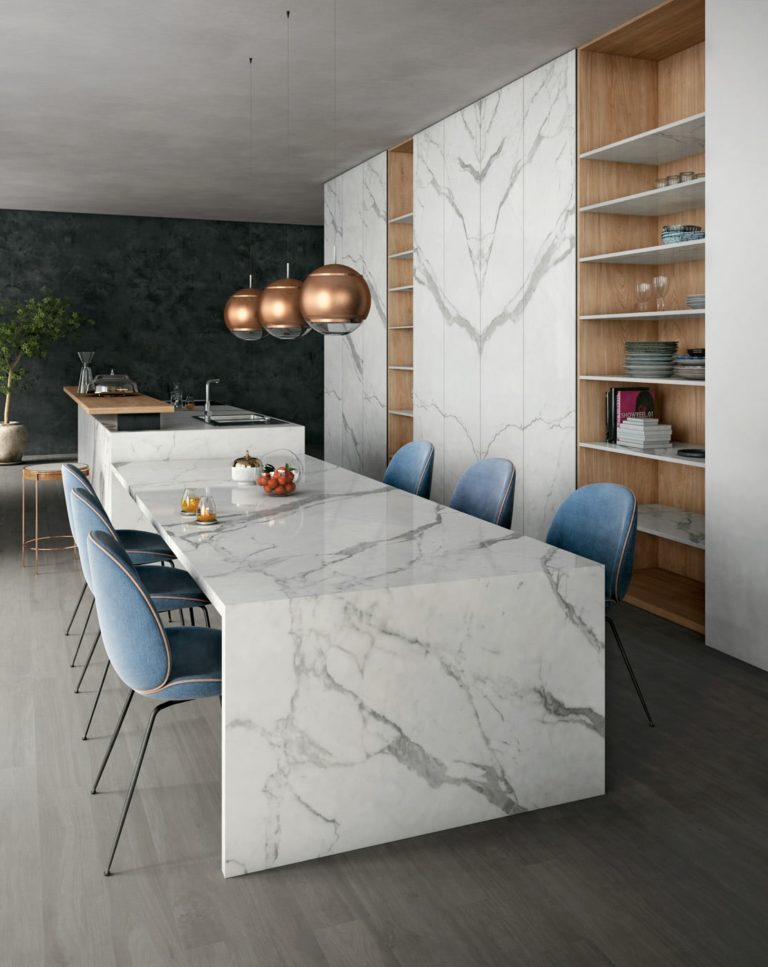How to Pick the Best Surface for You & Your Home
Picking the right kind of countertops for your lifestyle is very important. There are many factors to take into consideration such as high maintenance vs low maintenance, natural vs manmade, price point, look and feel, resale/increased property value, and more. Honestly, it can be quite overwhelming without proper guidance.
In this article we cover the most popular types of countertop materials and what you need to know before making any decisions about which one is right for you and your home.
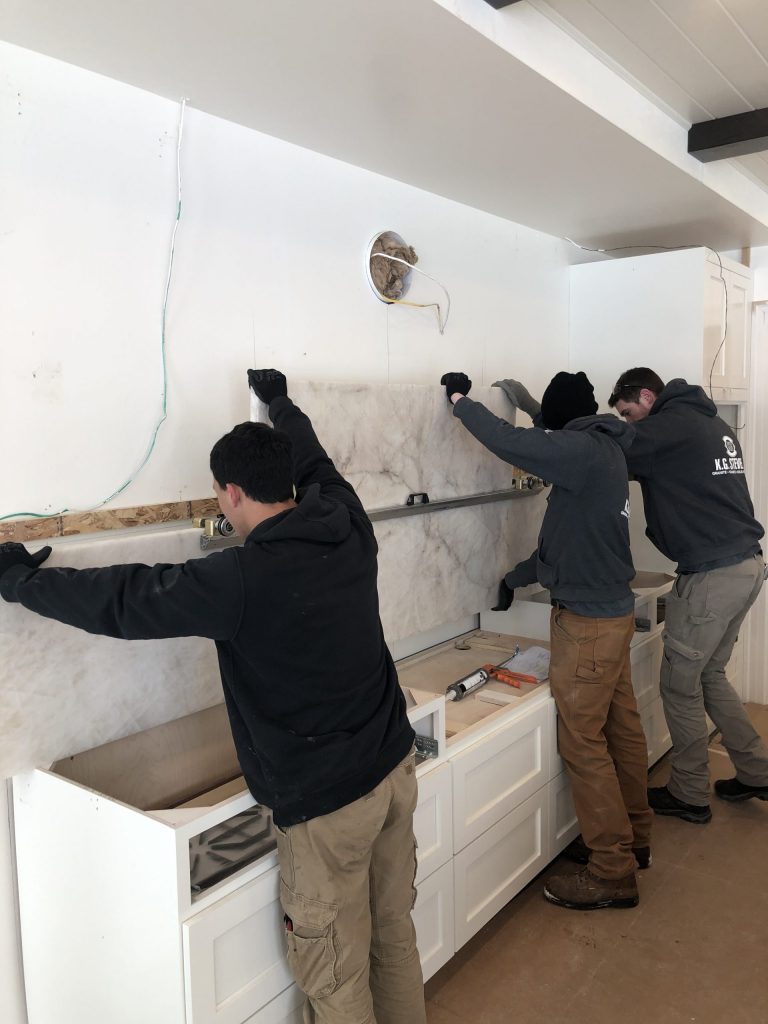
Laminate Countertops
Laminate has come a long way since its introduction in the 1940’s. While it may have fallen out of popularity in more recent years, laminate is starting to make a huge resurgence. Brands are breathing new life back into this once staple surface. Endless new and stylish options are available on the market these days. There are also fresh ways of installing this product – think undermount sink…yes, with laminate tops!
Pros:
- Affordability.
- Numerous designs and styles.
- Very easy to clean and maintain.
Cons:
- Can have a shorter lifespan and is susceptible to burns and chips.
- Can lack depth. Laminate is essentially an image layered on particleboard sealed with resin. Because of this, laminate countertops can lack the depth that you might get with the rest of our options below.
Quartz Countertops
Quartz is a naturally occurring mineral found in the earth. However, quartz countertops are actually both natural and manmade. Quartz countertops are made by grinding up the natural mineral and binding it with resins and pigments.
Pros:
- Because of the way these countertops are made with the mineral compacted with other synthetic materials, quartz countertops are quite durable.
- Aesthetically pleasing. Gives any space a sleek and beautiful look. These tops typically come in a multitude of finishes as well including polished and honed.
- Consistent. Quartz countertops are consistent in color from slab to slab.
- Non-porous. This means maintenance is rather easy and that it is both stain and bacteria resistant. There is no need to seal this kind of countertop.
Cons:
- Quartz countertops are on the pricier side of the countertop cost spectrum.
- Because it is technically manmade, some slabs of quartz that are trying to mimic the look of natural stone, might miss the mark and come off looking fake.
- Susceptible to some heat damage because of the synthetic materials used to bind the quartz together, however they are fairly heat resistant. It is still recommended that you use trivets or some sort of hot pad to protect your surfaces.
Quartzite Countertops
Not to be confused with quartz, quartzite is a naturally occurring stone cut into slabs, much like granite or marble.
Pros:
- Similar look to marble, however it is lower maintenance than marble is. It is a lot less porous than some of its natural stone counterparts.
- Easy to clean.
- Quartzite is a hard stone, making it one of the most durable materials on the market.
Cons:
- Not unsusceptible to staining so it’s recommended that spills or messes be cleaned up right away to avoid any staining.
- Will still show scratches and is not heat resistant much like quartz.
- Because it is a natural stone, you will need to seal it regularly in order to maintain it.
- Limited color choices
Solid Surface Countertops
These are manmade countertops using synthetic materials like acrylic or resins.
Pros:
- Endless possibilities of applications. Because its manmade, hundreds of styles, patterns, and colors are available to you.
- Seamless look. You can get inconspicuous seams with this type of countertop, not something that is available with slab type products.
- Non-porous. This means maintenance is rather easy and that it is both stain and bacteria resistant.
- While it’s not as affordable as laminate, solid surface can still be a cost effective option. However, some manufacturers and patterns boast prices that can rival natural stone.
Cons:
- Not scratch or heat resistant. However, a pro of solid surface is if you do scratch it, you can often buff the scratch out with an abrasive pad and cleaner. Please use caution when doing this or consult your supplier or installer before doing so.
- Vulnerable to strong chemicals or harsh cleaners.
Granite Countertops
Granite is a naturally occurring stone that comes from a quarry and is cut into slabs and polished.
Pros:
- Can elevate any room and offer timeless elegance. No two pieces of granite are alike so its as if you are getting a one of a kind piece of artwork.
- It is a hard stone that handles normal wear and tear nicely.
- Scratch resistant and is more heat resistant than the surfaces we’ve already covered.
- Multiple finishes are available: polished, honed, leather, hammered, etc.
Cons:
- Granite is very porous, so it needs to be properly sealed to avoid stains and bacteria. Because it is a natural stone, you will need to seal it in order to maintain it. Fortunately, lifetime sealers are now available.
- Granite can be on the expensive side, similar in pricing to quartz and quartzite.
Marble Countertops
Marble is a classic material that has been used for centuries, both in architectural and art. This natural stone forms when limestone changes under pressure over millions of years – it changes both physically and chemically to become marble. It is absolutely gorgeous, but is it worth it?
Pros:
- The “it” surface. Marble is a beautiful stone that is extremely “in” right now and can suit many design styles. They make a bold statement and are truly the standout in the world of countertops.
- Price flexibility. There are a wide variety of qualities and prices when it comes to marble. Some types of marble can actually be fairly cost effective as far as natural stones go. However, luxury marbles, like Carrara or Calacatta marble, will be a lot more expensive as it is less readily available and offers more veining and those marble-like characteristics that people are usually after.
- Marble is heat resistant; however, you should never risk placing something piping hot on the surface as it could cause discoloration or burning.
- Marble is a wonderful surface for the baker in the family as it is great to roll dough out on.
Cons:
- Like other natural stones, marble is a very porous and high maintenance surface. It can degrade over time, so keeping up with maintenance right from the start is highly important to your surface’s longevity. It requires regular sealing.
- Soft stone. Marble is a much softer stone than its other natural stone counterparts (granite), so it is quite susceptible to scratches and chips.
- Acidic liquids and harsh chemicals can eat away at the sealant on marble, making it more vulnerable.
- Because marble is soft and needs extra care and maintenance, we would recommend the selection of a manmade quartz product that has the look of marble.
Soapstone Countertops
Soapstone is a natural stone consisting of chlorite, magnesite, and dolomite. It also contains a fair amount of talc which gives it its characteristically milky soft look.
Pros:
- The unique beauty and warmth this surface can bring to a space is unmatched.
- Non-porous. Soapstone is less likely to stain than other natural stones, keeping it easy to clean and bacteria free, plus you don’t have to seal it.
- Holds up against heat.
Cons:
- Just because you don’t have to seal it doesn’t mean that it is completely maintenance free. This surface still requires a periodic oiling for aesthetic reasons mainly. It helps keep the stone looking its best and lets the stone naturally patina.
- Soft stone. While it’s more of a soft stone, nowhere near as hard as granite, soapstone is still fairly durable. With that said, it is susceptible to scratches and chips so avoid cutting directly on the surface or dropping anything heavy on it.
Concrete Countertops
Concrete is a bit of a wildcard when it comes to surfaces. The outcome of having this type of countertop installed can vary based on a number of factors and customizations. This includes shape, color, thickness, texture, installation etc. We would recommend having a professional install your concrete tops instead of going the DIY route. The environment, drying conditions, and the concrete recipe should only be done by professionals that are experts in the field.
Pros:
- Highly customizable.
- Great looking and hard-wearing. The vibe a concrete countertop exudes is unlike any of the other surfaces we’ve talked about so far. It is very cool and almost industrial looking, yet it can fit a numerous amount of design directions.
Cons:
- It can crack. Cracks are likely to occur especially if it was poured in place instead of being precast. Precast concrete has additives in it that help prevent it from cracking, however it is not a fool proof system. All houses naturally move and settle which can cause this cracking to occur. Thankfully these cracks aren’t very big and can be easily fixed.
- Concrete is also susceptible to stains and bacteria absorption as it is a very porous material. It is especially important to keep up with the maintenance of your concrete tops and make sure that it is sealed properly and often enough. Even with the proper maintenance, concrete tops are still going to show signs of wear and tear. Concrete tops are never going to look perfect, so if that is something that would drive you nuts, you might want to consider a different material for your surface.
Wood Countertops
Wood countertops, or butcherblock countertops, have somewhat of a timeless appeal to them. They’ve been gaining a lot of popularity in the last decade. When it comes to picking out wood countertops, it is important to consider wood species as it will affect the look and durability of the surface. Certain wood species are a lot harder than others, making them more durable when used as a countertop. Popular options are birch, cherry, hard maple, walnut, and white oak. With that said, do your own research or consult your designer or supplier on which wood species will be best for your situation.
Pros:
- All-natural. Wood is a great choice if you want an all-natural material.
- Warmth. Wood surfaces have a lot of warmth to them which can’t always be said about the other surfaces.
- The beauty of the way the wood is cut and put together. All woods have different properties and graining; plus, different types of wood take stains and sealants differently. This means you can have really light toned countertops, dark toned countertops and anything in between. The way the wood is cut is also a factor in what wood countertops look like. Most of us are familiar with butcherblock countertops but there are also end grain wood countertops that provide an entirely different look. See the photos below for examples of each.
- Wood countertops have a very long lifespan. While they do dent and scratch much easier than the rest of the tops we’ve discussed so far, you can sand and resurface them a few times without having to fully replace them.
- Functional. You can use a wood countertop as a work surface and cut directly on it. However, if you want to preserve the look of your countertop, you should still use a cutting board.
- Low-cost option.
- Eco-conscious. Wood tops aren’t compatible with normal household cleaners. Depending on your lifestyle, this could actually be a con. They require different methods to keep clean, such as a mixture of water, vinegar, and essential oils. For those that don’t like using harsh chemicals, this could be a viable option.
Cons:
- Temperature sensitive – both hot and cold. Wood tops can burn if you put high heat things directly on the surface. Ice or other cold items can also leave a mark if they sit on the surface too long.
- Depending on how you initially treat the wood, butcherblock countertops will require regular maintenance such as sealing or oiling to protect the wood from scratches, moisture damage, and to keep from drying out. It’s important to do your research and/or consult a professional about how to maintain and clean your wood tops. If that type of maintenance isn’t suitable for your lifestyle, it would be wise to pick a different top.
- Climate sensitive. Wood naturally tends to expand or contract whether it’s in a dry or moist climate, making it susceptible to cracks or rot. As long as your home is temperature controlled with an HVAC system, this issue should be nothing to worry about.
Dekton Countertops
Dekton is an “ultra-compact surface.” It is made by combining raw materials under pressure and heat using a unique fabrication process called Sinterized Particle Technology. This means that it is one of the most durable countertop choices out there.
Pros
- High scratch resistance
- Non-porous & stain resistant
- Fire and heat resistant
- Easy maintenance, just wash with soap and water
- Resistant to daily impacts and abrasion, however, Dekton has shown to chip easier than quartz
- Versatile – large format, minimal joining, multiple thickness options
Cons
- Dekton falls on the higher end of the price spectrum. Cuts, holes, seams, color choice, and thickness all dictate how much your Dekton tops will cost.
Porcelain Countertops
Porcelain is made by heating a mix of natural materials, such as kaolin (china clay), along with a silicate mineral. It is then coated with a glaze to give it the final look. Porcelain countertops can come in polished, satin, and matte finishes. This type of countertop is relatively newer on the scene but it has been gaining a lot of popularity lately and it is easy to see why – it is absolutely stunning!
Pros
- Heat resistant
- Scratch resistant. However, it is still recommended that you not cut directly on the surface if you don’t have to.
- Porcelain, in most cases, is actually stronger than granite.
- Easy to maintain since it is non-porous and stain resistant
- Natural product. Since it is made of natural and raw materials, it can actually be recycled at the end of its life.
Cons
- Fragile and easy to crack – especially if you drop something heavy on it. Porcelain is very lightweight, which is nice during install, however it can also crack and chip and break during install.
- New on the scene so it is yet to be determined if these types of tops will stick around for the long haul or if they will give you any return on investment.
Conclusion
While we only scratched the surface (pun intended) on each type of countertop, we’d encourage you to do more of your own research to make sure the choice you make is the right one. And once you do make your purchase, it is very important that you consult your designer or supplier about the proper care of your countertops to ensure that they last.
If you’re in the market for countertops and would like even more guidance, either stop by our showroom or contact us here. Educating our clients so that they can make the best selection for their space is of upmost importance to us. If you’d like to learn more about our team and what we do, check out our website, portfolio, and other blog posts. You can also find us on social media!
Author:
Amber Sabrowsky,
Distinctive Design Studio Office Manager



